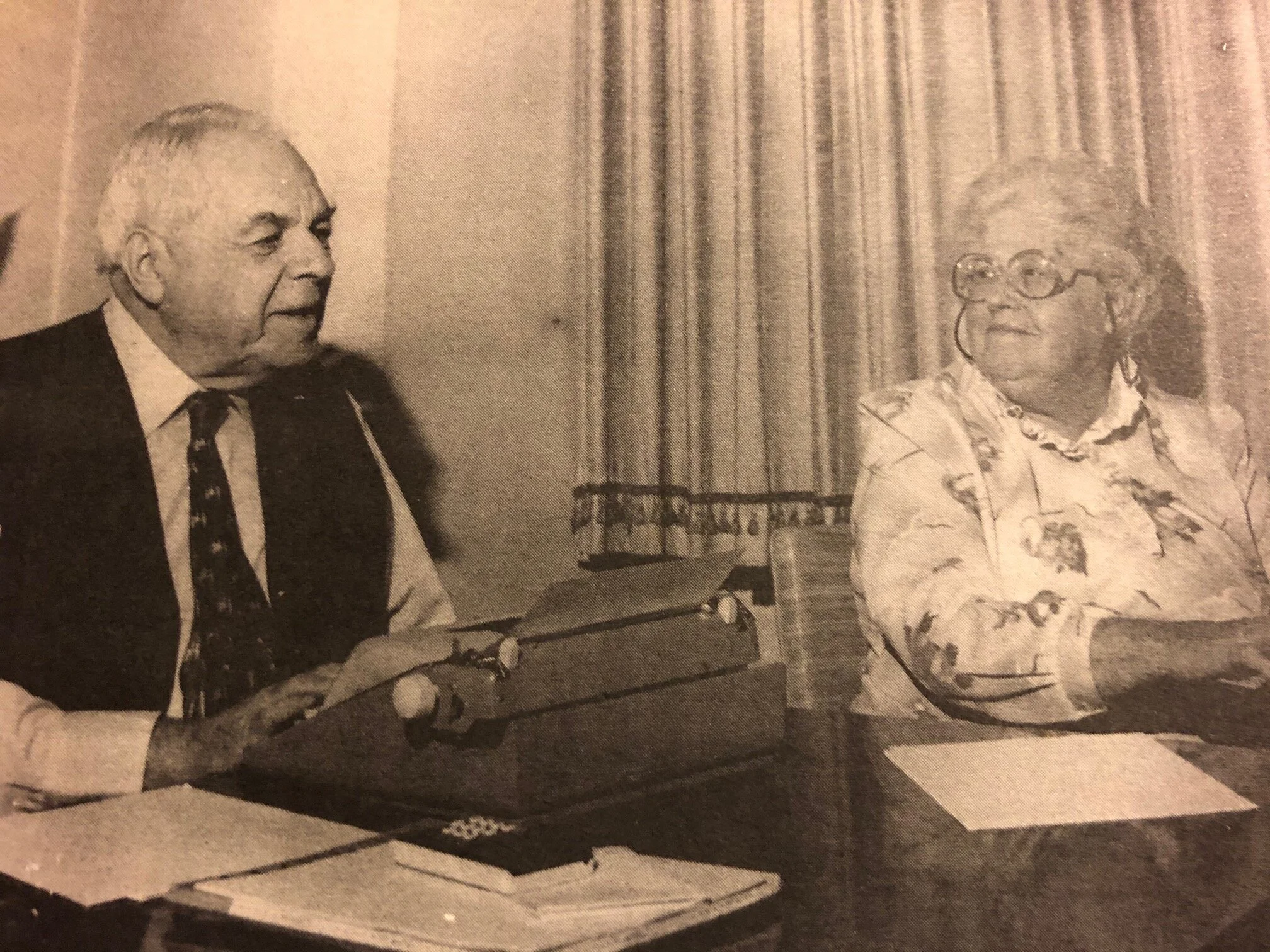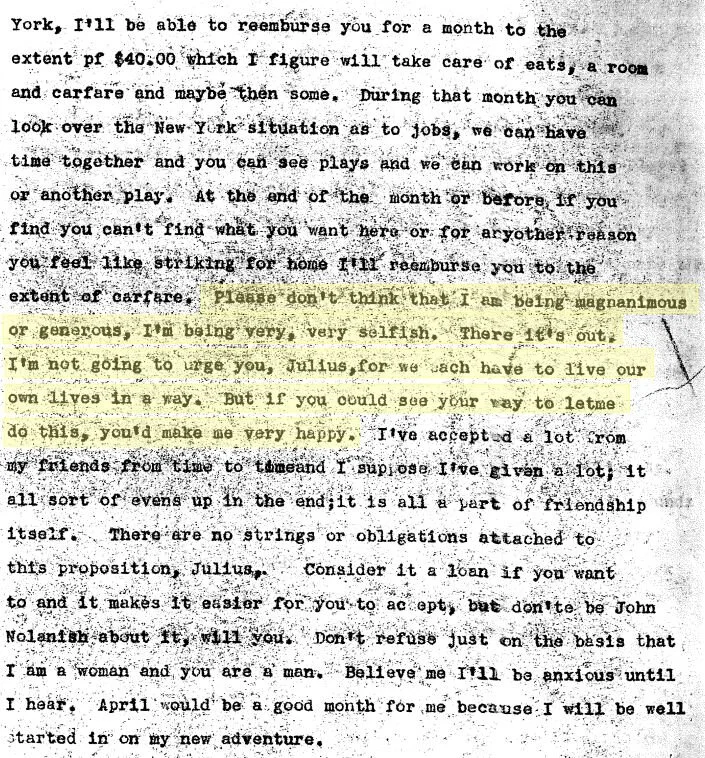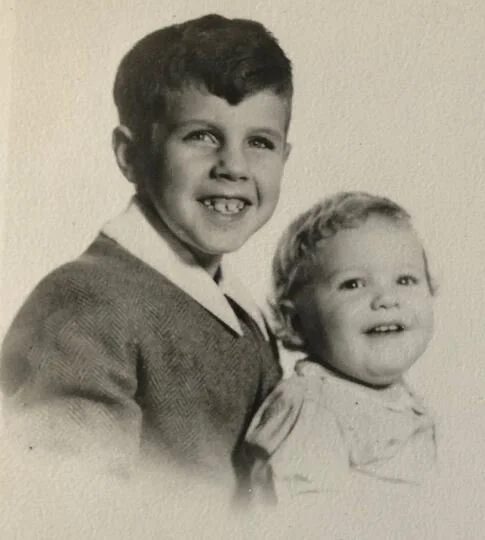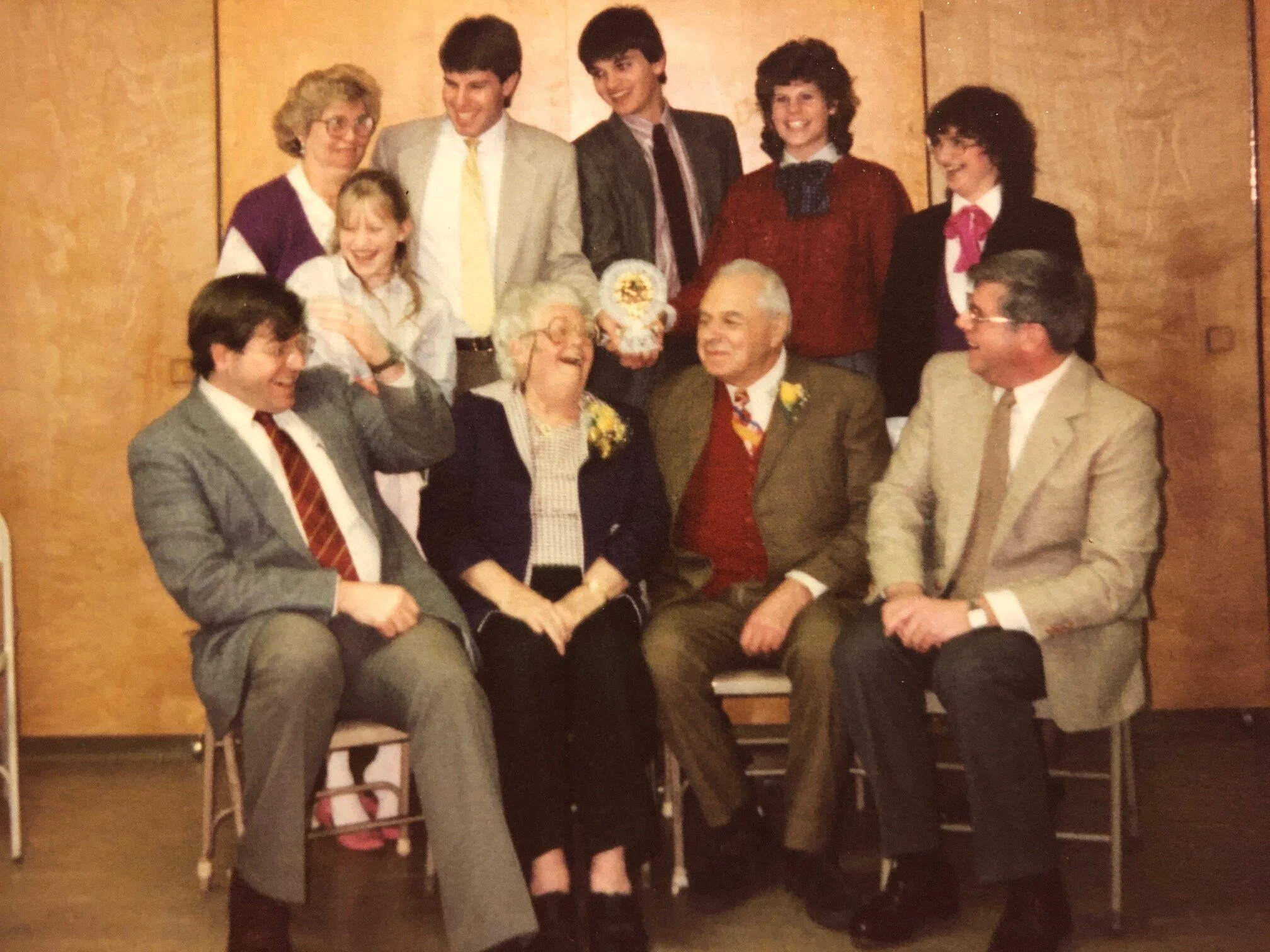This is a special story about two incredibly strong, passionate, and compassionate people.
It is a love story in a conventional sense in that it is the romantic union of two people seeming to be made for each other.
It is also a love story in the greater, less conventional sense in that the strength in their union brought a powerful love in the form of acceptance, support, and joy to a whole community and their family. Their presence mattered deeply to many and their influence lives far beyond through those who they touched. That is why we have compiled this material for this story.
Here are Alice and Julius:
This photo is from one of their Holiday Greeting cards from the 1980s. They are posed, sitting at their typewriters in the dining room in their home of many years in Baldwin, NY, on Long Island. The back side of their card was the greeting, written like a short play:
But let’s go way back…
They met in the 1930s in the most unconventional way —— through a personal ad. Living on Staten Island, Alice posted a personal ad in the Saturday Review of Literature on September 14, 1935. Here is what it said:
From Madison, WI, Julius replied. Here was part of his response:
Though Alice said that she received over 60 responses, she said she replied only to Julius. Here is a part of her response:
And they were off from there. As you can see, they were both head-strong and interested in the world and others.
And as Alice noted, she was four years older than Julius. The differences did not end there. Alice also had an undergraduate degree from Boston University and a graduate degree from Columbia. Julius did not have a high school diploma. He ran away from home at an early age and rode the rails. He would be quick to let you know that a hobo is not a bum; a hobo is an itinerant worker. By the time Alice posted this ad, Julius lived in Madison. But you can see why he might challenge her about what might define an “educated man.”
They sent each other articles about liberalism and discussed politics and education. They confided in each other about their struggles with work or lack thereof (Julius). Alice was better at keeping records, so we mostly just have the letters Julius wrote her and some carbons of the letters she wrote him. You can find what we have of the entire correspondence in the “original correspondence” tab. It is much better writing than this narrative can justify.
In this one, Julius is giving her romantic advice, which seems like pretty wise advice for such a young guy:
They wrote a play together, though we do not seem to be able to locate that. They shared what they wrote separately and gave each other notes about each portion. They gave each other feedback about other things they wrote and they made outlines for the play they were writing and filled it in together.
Julius advised Alice about career changes and she offered him hope in his job search. Alice almost moved to Utah. Julius bemoaned that he didn’t have the resources to come and meet Alice in New York.
That was when Alice (never beholden to typical male-female societal norms) made a big step and offered help in the form of a request, … a request she urged him to think was a selfish move on her part. See here:
“I’m being very, very selfish. There it’s out.”
Find all surviving letters in the “original correspondence” tab.
Julius went out to New York in April. Here is a photo of them with Hal and Tillie Cohen in 1936. Alice and Julius are on the right.
Alice and Julius were married in December 1936.
They had two sons: Barton was born in 1939 and Russell was born in 1945. Here is a picture of them (from a holiday card):
Bart wrote this short summary of their life:
Alice and Julius Perlman
By their son, Bart Perlman
I was at an early age when I began to realize that my parents were not like the parents of my friends. First, in the early 1940’s my father worked in a defense plant (nights) while fathers of my friends were directly involved in the War. I later found out that my father was a CO - Conscientious Objector – a very unpopular stand, but one that I know was consistent with who he was. Another difference was that none of the mothers of my friends worked, but my mother did. She worked at an office of the New York State Unemployment Service and developed a friendship with a co-worker, a Black woman. She did what would seem normal today and invited her and her family to our home and we visited them. They had a son about my age. However, in the 1940s it was not common for Blacks and Whites to socialize. I felt somewhat uneasy about the whole thing, but learned a lot about what it must have been like for a Black boy to grow up at that time.
Our family started attending the local Methodist Church because it was only a block away from our home. The other reason was that my mother was raised in a Christian home and her Bachelor’s Degree was in Christian Education. My father was raised in a Jewish home, but, while his family probably observed the major holidays, they were not practicing Jews. He joined the Methodist Church probably so our family could all go together. They became very active in the church and could be considered “pillars” until the early 1960’s when the civil rights movement was surging. They realized that the minister and members of the church were more interested in maintaining the status quo (and keeping our Long Island town of Baldwin, New York all White) than helping advance this movement.
My father was aware of the Unitarian Universalist church in the next town of Freeport, but now he started attending the services. My mother stayed with the Methodist Church for a while, but then followed him. With support from their new church they became more active in civil rights. They exposed discrimination in real estate by posing as prospective buyers and were shown many homes. They were followed by an equally qualified Black couple who were told there were no homes available. My mother would go on to serve two terms as President of the congregation and they were both very respected and loved members. In fact, the South Nassau Unitarian Church organized a special program to honor them and the contributions they made to the church.
During their working lives, my father owned and operated a one-man print shop in Baldwin. He tried to get my brother, Russ, and I interested in the business with the hope that we would take it over some day, but neither of us were interested. However, we both learned how to feed a job press and Russ worked for a printer while attending college. The business supported our family, but my father would spend a lot of time helping people who were starting a business by helping them design their business cards, letterhead stationery, sale flyers, etc. I’m sure he lost money on those small sales, but he got a lot of satisfaction from helping people, made long lasting friends, and set an example for Russ and me that sometimes in business money is not the most important objective.
Before they met in the mid 1930s my mother had graduated from Columbia University with a Master’s Degree in English. Starting in the 1950s she worked for a non-profit organization in New York City dedicated to helping public education – “The New York State Citizen’s Committee for the Public Schools.” Their combined income enabled Russ and I to go to college.
In 1989 after a few health scares affecting my mother, we convinced them to move from their home in Baldwin. However, before agreeing to move to Twining Village in Holland Pennsylvania, I had to show them that there was Unitarian Church within driving distance. At the Unitarian Universalist Church at Washington Crossing they developed many friends, including Jack Sharp, and loved everything about the church. I’m sure that if they had moved to the area twenty years sooner, one of them would have served as President.
My mother passed away in 1993 at the age of 87. My father probably would have lived many more years had he not suffered a fall on the pavement. He passed away in 1994 at 84.
No account of my parents’ lives would be complete without telling my father’s favorite Unitarian joke. Many years ago in France there was a band of three outlaws who robbed, killed, and terrorized the whole area. One was a Roman Catholic, another was Jewish, and the third was, of course, a Unitarian. Well, they were finally captured, tried in a court of law, convicted, and sentenced to death by guillotine. On the day of their execution the Roman Catholic was brought forward and put his head on the block and the executioner signaled for the blade to be released. However, when the blade came down it miraculously stopped inches from his neck. The executioner announced that according to the laws of France, they had attempted the execution and now, because it was not successful, they had no choice but to let the Roman Catholic go free. Next, the Jewish man put his head on the block and again the blade came down and stopped inches from his neck. He also was let go free. Next the Unitarian came forward and insisted on taking his punishment like a man by putting his head on the block face up. As he was waiting and looking up at the guillotine he shouted, “WAIT, STOP, I THINK I SEE THE PROBLEM.”
—— a more complete version of Bart’s family history can be found in the family histories tab. There you will find more interesting complexities, like the controversy surrounding buying the family home and having Alice’s friend, Deedy, rent the downstairs to run a preschool and to impose her parenting opinions on the Perlmans, … and other rich, interesting details.
This is the photo from their first holiday card. You can find the entire collection (that remains) in the “holiday card” tab. Many of the holiday cards were taken in front of the shop, no doubt sliding in a little publicity for the shop.
Russ also wrote about what it was like growing up with Alice and Julius as parents. This was written shortly after Julius died, so it focuses on Julius’s ethics. See here (scroll right for additional pages):
As Bart’s short history mentioned above, Alice and Julius were very involved in the civil rights movement in the 1960s. They helped defeat the racist real estate practices in Baldwin. Russ used to tell a story of returning from college in the early 60s to find a group of people with baseball bats on the front lawn. He rushed into the house to find out what these people wanted with his (seemingly rather elderly) parents (they were older than other people’s parents). They responded that these people were angry with them for their work in the civil rights movement and their efforts to try to help African American (current term) families settle in the community. Russ, with all of the bluster of a college kid, was outraged. He met his parents demeanor, which was of passive resistance. They said, “We do not hate these people; we hate what they are doing.”
Alice and Julius were active in the anti-war movement as well.
One of the cases in which they stepped up when they saw injustice is in the case where an African American Baldwin teacher was accused of molesting a white girl. Among others in their community, they provided support for this teacher to be able to make it through the trial and not have to resort to just leaving the community and attempting to settle elsewhere. In trial a witness broke down and admitted that they were coerced into lying on the stand. Here is an article that describes the case. Alice is in the 2nd row and Julius is two rows behind her in this cover photo. Scroll right for the article:
While Alice and Julius were visiting Russ and Nancy (Russ’s wife) in St. Lucia (they were the Peace Corps), a shop owner recognized them and took them over to the magazine rack to show them their own photo.
While Russ and Nancy were in St. Lucia, they met a bright young high-schooler who wanted to emigrate to the United States and go to college. Alice and Julius sponsored Herb Ross and considered him a son and a dear friend their entire lives following his arrival. Herb went to college and got a good job working at the Port Authority. He married and had one daughter, Elise.
Bart and Russ made families, too. As mentioned above, Russ married Nancy. But before that Bart married Jane. Bart and Jane had two children: Greg and Debbie. Russ and Nancy had two children: Max and Lori. Here is a photo of all of them at Alice and Julius’s 50 anniversary, in 1986:
Now, there are numerous great-grandchildren. Greg had three daughters with his first wife, Debbie: Erin, Lauren, and Emily. Debbie had two kids with her husband, Randy: Tyler and Alexandra. Max and his wife, Nancy, also had two kids: Bradley and Brooke.




















